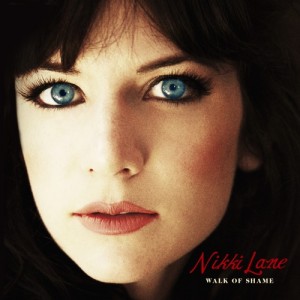Trying to pin down Nikki Lane’s music is about as difficult as pinning down the young singer/songwriter’s history, which has included moving from Greenville, South Carolina to Los Angeles to New York and to her current residence in Nashville. Simply put, the tracks on Walk Of Shame are country songs, but that simplification is unfair and would draw ill-advised comparisons. Lane has little in common with someone like Carrie Underwood, who lacks the inherent darkness and danger that are alive in Lane’s work. Likewise, more “alt-country” artists like Jenny Lewis or Neko Case also have little in common with Lane, who, for all their admirable qualities, simply lack the sense of authenticity that drips off of Lane’s record. Nikki Lane is a country artist for people who don’t like country, harkening back to artists like Loretta Lynn in spirit, but with the sense of mind to have listened to punk music at some point in her life and have enough modern touches to never sound completely like a throwback.
Of course, this kind of project wouldn’t work off gimmick alone. Lane has to give her sound credence with memorable songs, which she appears to have in spades. Opener “Lies” displays a voice that is not trying to mask its twang, coming off as idiosyncratic and unafraid to rub as many people the wrong way as it is to please a host of others. The song splashes in puddles of desperation, bringing back memories of the Mermaid Avenue albums and showing a slice of every residence she has held: the comfort of the South, the alienation of Los Angeles, and the darkness of the New York nights. The title-track that follows is equally effective, upping the tempo and pleading with equal urgency, using a fairly unimaginative narrative to showcase Lane’s seemingly natural melodic gifts, and even packing in a surprisingly fragile conclusion that is among the albums many high points.
At its best, Walk Of Shame bleeds with timelessness, seeming as suited for a dive bar jukebox in decades past as it would be on present day coffee shop’s satellite radio station. Lane is able to seamlessly transition from bouncy, all-points-lead-to-the-chorus jams like “Gone, Gone, Gone” to traditional, booze-soaked boot tappers like “Hard Livin’.” Hell, even when the songs get stripped down to bare arrangements, Lane’s voice still carries a song like “Save You,” turning what could easily be cliche drivel in other hands into a genuine, tear-in-your-beer anthem.
There is plenty of room to grow for Lane, and Walk Of Shame could use for some variance from the confessional lyrical quality. Time will see if Lane becomes more adventurous in her wordplay, and whether what she has to say can equal the way she says it. But, Lane is very much working within a genre and asking for poetic puzzles may be as pointless as asking Woody Guthrie to stop writing about dust. And despite any shortcomings (closer “I Am Satisfied” falls off the tightrope of taste to land in Judds territory), Lane has crafted a crowd pleaser in Walk Of Shame, one that is easy to imagine catching fire once it finds the right audience, and one that will make even casual observers curious as to what will come from Nikki Lane next.

